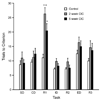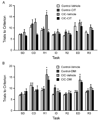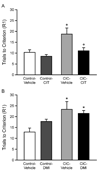A cognitive deficit induced in rats by chronic intermittent cold stress is reversed by chronic antidepressant treatment
- PMID: 20149267
- PMCID: PMC2924942
- DOI: 10.1017/S1461145710000039
A cognitive deficit induced in rats by chronic intermittent cold stress is reversed by chronic antidepressant treatment
Abstract
We have previously reported that 14-d chronic intermittent cold (CIC) stress induced a cognitive deficit in reversal learning on the rat attentional set-shifting test. This effect may be related to dysregulation of 5-HT function in orbitofrontal cortex, as a model of cognitive dysfunction in depression. To test the ability of chronic antidepressant drug treatment to reverse the cognitive deficit induced by CIC, it was first necessary to assess the temporal characteristics of the CIC-induced cognitive deficit. Thus, in the first experiment, we assessed the duration of the cognitive deficit following 2-wk CIC stress. Replicating previous experiments, CIC induced a reversal learning deficit tested 3 d after the last cold exposure. However, cognitive performance of CIC-stressed rats was no different from unstressed controls when tested 7, 14 or 21 d after termination of the stress treatment. We next compared behaviour 3 d after 2-wk CIC to that seen 3 d after 5-wk CIC, and found similar deficits in reversal learning. Thus, in the final experiment, antidepressant drug treatment was initiated after 2-wk CIC stress, and was maintained for 3 wk, concurrent with the continuation of CIC stress. Both chronic and acute treatment with the selective serotonin reuptake inhibitor, citalopram, but not the norepinephrine reuptake blocker, desipramine, reversed the cognitive deficit induced by CIC stress. Thus, this stress-induced cognitive deficit may be a useful model for cognitive deficits related to prefrontal cortical hypoactivity in depression, and for investigating neurobiological mechanisms underlying the beneficial effects of chronic antidepressant drug treatment.
Conflict of interest statement
The authors have no conflicts of interest to report, nor any involvement to disclose, financial or otherwise, that may bias the conduct, interpretation or presentation of this work.
Figures





References
-
- Anisman H, Zacharko RM. Behavioral and neurochemical consequences associated with stressors. Annals of the New York Academy of Science. 1986;467:205–225. - PubMed
-
- Beats BC, Sahakian BJ, Levy R. Cognitive performance in tests sensitive to frontal lobe dysfunction in the elderly depressed. Psychological Medicine. 1996;26:591–604. - PubMed
-
- Beck AT. Cognitive therapy and the emotional disorders. New York: Int. Univ. Press; 1976.
-
- Beck AT. The current state of cognitive therapy: A 40-year retrospective. Archives of General Psychiatry. 2005;62:953–959. - PubMed
-
- Beck AT, Brown G, Steer RA, Eidelson JI, et al. Differentiating anxiety and depression: A test of the cognitive content-specificity hypothesis. Journal of Abnormal Psychology. 1987;96:179–183. - PubMed
Publication types
MeSH terms
Substances
Grants and funding
LinkOut - more resources
Full Text Sources
Medical
Miscellaneous

